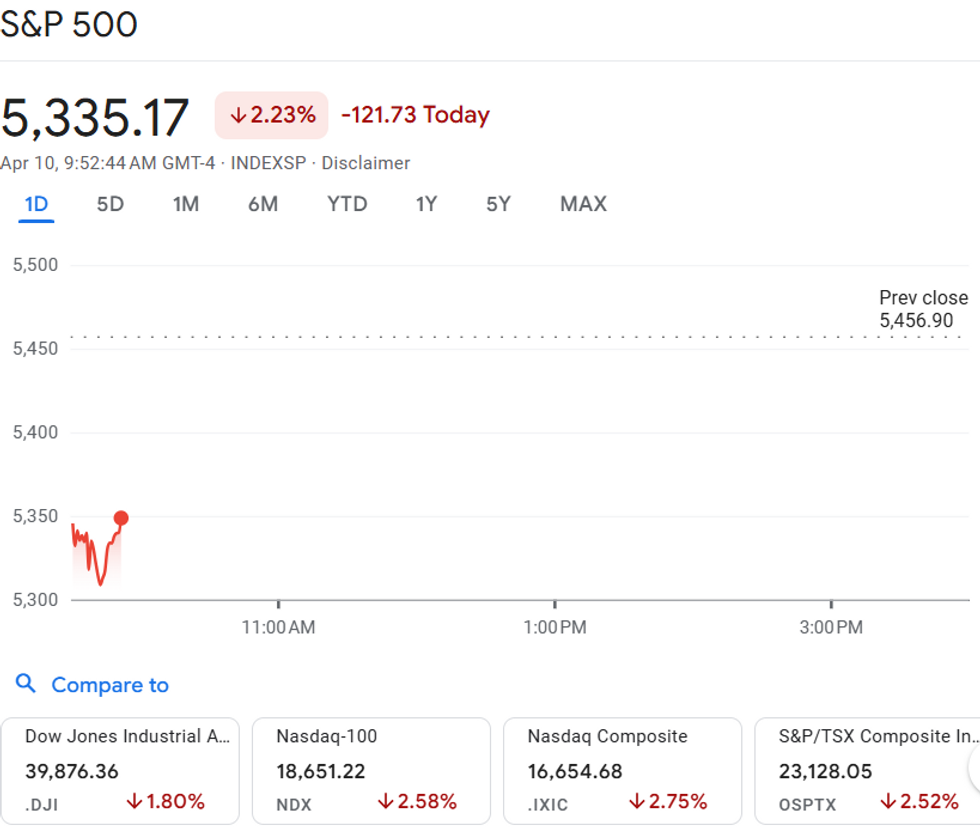Donald Trump: 'China wants to do a deal'
GBNEWS
Economists have warned the economic damage is done from Trump's tariffs and many predict a US and global recession
Don't Miss
Most Read
Trending on GB News
The US stock market opened lower on Thursday, snapping back from Wednesday’s historic rally.
Investor concerns have resurfaced over the long-term economic impact of President Donald Trump’s aggressive trade policies.
Despite the brief boost, market optimism faded quickly. The Dow Jones Industrial Average fell 989 points, or 2.4 per cent. The S&P 500 dropped three per cent, while the Nasdaq Composite declined 3.7 per cent.
The 10-year Treasury yield also declined to about 4.3 per cent, reflecting continued market uncertainty.
Stocks are pulling back after their biggest one-day rally since World War II, driven by President Trump's announcement of a 90-day pause on tariffs for U.S. trading partners that haven’t retaliated.
However, a blanket 10 per cent tariff remains in place, and levies on Chinese goods have been raised to 125 per cent.

Currency markets remain uneasy as investors weigh the long-term impact of tariffs on global growth.
Leading the declines in the stock market were Apple and Tesla, which fell more than three per cent and five per cent, respectively. Nvidia dropped 4.9 per cent, while Meta Platforms slid 3.7 per cent.
Meanwhile, the U.S. dollar dropped as fears grew that Trump’s trade war could weaken the economy. The dollar fell one per cent against the pound, which rose to $1.296, and lost 1.5 per cent against the euro, which climbed to $1.113.
Currency markets remain uneasy as investors weigh the long-term impact of tariffs on global growth.
"The market is waking up to the reality that the economic pain is already here,” said one analyst. “The pause might slow the bleeding, but it won’t undo the damage."
The losses followed a historic surge on Wall Street, where the S&P 500 jumped over nine per cent — its third-largest one-day gain since World War II.

Deutsche Bank analysts also suggested that the U.S. government may be intentionally encouraging the selloff in Treasury markets
GETTY
The Dow posted its biggest percentage rise since March 2020, and the Nasdaq recorded its second-best day ever, with its strongest performance since January 2001.
Deutsche Bank described the current downturn across stocks, bonds, and the U.S. dollar as a "simultaneous collapse in the price of all U.S. assets."
They called the current environment "uncharted territory," noting that markets are no longer reacting in traditional ways to economic stress.
Typically, during times of crisis, investors seek safety in U.S. dollars and Treasury bonds. But this time, both are falling in value — a sign, analysts say, that investor confidence in American financial stability is being shaken.
Deutsche Bank analysts also suggested that the U.S. government may be intentionally encouraging the selloff in Treasury markets in an attempt to lower asset valuations and reduce trade imbalances.
"Reducing trade deficits effectively means reducing global demand for U.S. assets", they said.
Looking ahead, the bank warned that growing tensions with China could escalate beyond trade into a broader financial conflict, one that would damage both economies.
They noted: "There is little room left for escalation on the trade front. There can be no winner to such a war.”
As investors grapple with a volatile market and an uncertain policy environment, all eyes will be on how central banks and global leaders respond in the coming days — and whether more lasting relief will follow Wednesday’s temporary bounce.







